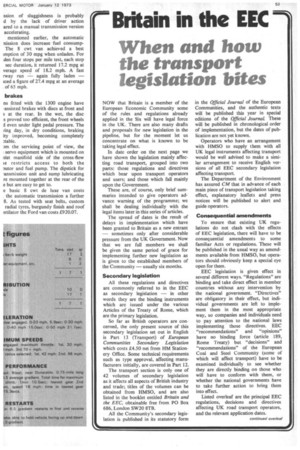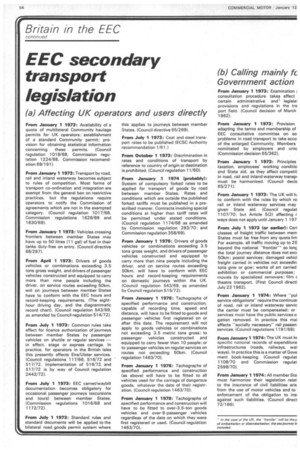Britain in the EEC
Page 55

Page 56

If you've noticed an error in this article please click here to report it so we can fix it.
When and how the transport legislation bites
NOW that Britain is a member of the European Economic Community some of the rules and regulations already applied in the Six will have legal force in the UK. There are also many drafts and proposals for new legislation in the pipeline, but for the moment let us concentrate on what is known to be taking legal effect.
In date order on the next page we have shown the legislation mainly affecting road transport, grouped into two parts: those regulations and directives which bear upon transport operators and users; and those which fall mainly upon the Government.
These are, of course, only brief summaries intended to give operators advance warning of the programme; we shall be dealing individually with the legal items later in this series of articles.
The spread of dates is the result of delays in implementation which have been granted to Britain as a new entrant — sometimes only after considerable pressure from the UK Government. Now that we are full members we shall be given the same period of grace for implementing further new legislation as is given to the established members of the Community — usually six months.
Secondary legislation All these regulations and directives are commonly referred to in the EEC as secondary legislation — in other words they are the binding instruments which are issued under the various Articles of the Treaty of Rome, which are the primary legislation.
So far as British operators are concerned, the only present source of this secondary legislation set out in English is Part 13 (Transport) of European Communities Secondary Legislation which costs £4.50 net from HM Stationery Office. Some technical requirements such as type approval, affecting manufacturers initially, are covered in Part 12.
The transport section is only one of 42 volumes of secondary legislation as it affects all aspects of British industry and trade; titles of the volumes can be obtained from HMSO, and are also listed in the booklet entitled Britain and the EEC, obtainable free from PO Box 686, London SW20 8TB.
All the Community's secondary legislation is published in its statutory form in the Official Journal of the European Communities, and the authentic texts will be published this year in special editions of the Official JournaL These will be published in chronological order of implementation, but the dates of publication are not yet known.
Operators who have an arrangement with HMSO to supply them with all UK legal instruments affecting transport would be well advised to make a similar arrangement to receive English versions of all EEC secondary legislation affecting transport
The Department of the Environment has assured CM that in advance of each main piece of transport legislation taking effect, explanatory leaflets and press notices will be published to alert and guide operators.
Consequential amendments To ensure that existing UK regulations do not clash with the effects of EEC legislation, there will have to be consequential amendments to some familiar Acts or regulations. These will be published in the usual way as amendments available from HMSO, but operators should obviously keep a special eye open for them.
EEC legislation is given effect in several different ways. "Regulations" are binding and take direct effect in member countries without any intervention by the national government. "Directives" are obligatory in their effect, but individual governments are left to implement them in the most appropriate way, so companies and individuals need to pay attention to the national laws implementing those directives. EEC
"recommendations" and "opinions" have no binding force (article 189, Rome Treaty) but "decisions" and "recommendations" of the European Coal and Steel Community (some of which will affect transport) have to be examined individually to see whether they are directly binding on those who will have to conform with them, or whether the national governments have to take further action to bring them into effect.
Listed overleaf are the principal EEC regulations, decisions and directives affecting UK road transport operators, and the relevant application dates.
EEC secondary transport legislation
(a) Affecting UK operators and users directly
From January 1 1973: Availability of a quota of multilateral Community haulage permits for UK operators; establishment of a standard Community permit; provision for obtaining statistical information concerning these permits. (Council regulation 1018/68. Commission regulation 1224/68. Commission recomendation 69/191).
From January 1 1973: Transport by road, rail and inland waterway becomes subject to rules of competition. Most forms of transport co-ordination and integration are exempt from the general ban on restrictive practices, but the regulations require operators to notify the Commission of agreements which are not in the exempted category. (Council regulation 1017/68. Commission regulations 1629/69 and 1630/69).
From January 1 1973: Vehicles crossing frontiers between member States may have up to 50 litres (11 gal) of fuel in their tanks duty-free on entry. (Council directive 68/297).
From April 1 1973: Drivers of goods vehicles or combinations exceeding 3.5 tons gross weight, and drivers of passenger vehicles constructed and equipped to carry more than nine people including the driver, on service routes exceeding 50km, will on journeys between member States have to conform with the EEC hours and record-keeping requirements. (The eighthour driving day, and the diagrammatic record chart). (Council regulation 543/69, as amended by Council regulation 514/72).
From July 1 1973: Common rules take effect for licence authorization of journeys between member States by passenger vehicles on shuttle or regular services in effect, stage or express carriage. In practice, for operators in the British Isles this presently affects Eire/Ulster services. (Council regulations 117/66, 516/72 and 517/72. Implementation of 516/72 and 517/72 is by way of Council regulation 2442/72).
From July 1 1973: EEC carnet/waybill documentation becomes obligatory for occasional passenger journeys (excursions and tours) between member States. (Commission regulations 1016/68 and 1172/72).
From July 1 1973: Standard rules and standard documents will be applied to the 11/41s, bilateral road goods permit system where
this applies to journeys between member States. (Council directive 65/269).
From July 1 1973: Coal and steel transport rates to be published (ECSC Authority recommendation 1/61.)
From October 1 1973: Discrimination in rates and conditions of transport by reference to country of origin or destination is prohibited. (Council regulation 11/60).
From January 1 1974 (probably): System of compulsory forked rates to be applied for transport of goods by road between member States. Rates and conditions which are outside the published forked tariffs must be published in a prescribed manner. Contracts involving special conditions at higher than tariff rates will be permitted under stated conditions. (Council regulation 1174/68 as amended by Commission regulation 293/70; and Commission regulation 358/69).
From January 1 1976: Drivers of goods vehicles or combinations exceeding 3.5 tons gross weight, and drivers of passenger vehicles constructed and equipped to carry more than nine people including the driver, and on service routes exceeding 50km, will have to conform with EEC hours and record-keeping requirements on domestic journeys within the UK. (Council regulation 543/69, as amended by Council regulation 515/72).
From January 1 1976: Tachographs of specified performance and construction, capable of recording time, speed and distance, will have to be fitted to goods and passenger vehicles first registered on or after this date. The requirement will not apply to goods vehicles or combinations not exceeding 3.5 metric tons gross; to passenger vehicles constructed and equipped to carry fewer than 10 people; or to passenger vehicles on regular services on routes not exceeding 50km. (Council regulation 1463/70).
From January 1 1976: Tachographs of specified performance and construction (as above) will have to be fitted to all vehicles used for the carriage of dangerous goods, whatever the date of their registration. (Council regulation 1463/70).
From January 1 1978: Tachographs of specified performance and construction will have to be fitted to over-3.5-ton goods vehicles and over-9-passenger vehicles regardless of the date on which they were first registered or used. (Council regulation 1463/70).
(b) Calling mainly ft Government action
From January 1 1973: Examination consultation procedure takes effect certain administrative and legislal provisions and regulations in the tra port field. (Council decision of March 1962).
From January 1 1973: Provision adapting the terms and membership of EEC consultative committee on so problems in road transport to take acco of the enlarged Community. Members nominated by employers and unio (Commission decision 65/362).
From January 1 1973: Principles taxation, employees' working conditio and State aid, as they affect competit in road, rail and inland waterway transpi most be harmonized. (Council decis 65/271).
From January 1 1973: The UK will h. to conform with the rules by which ro rail or inland waterway services may given State aid. (Council regulat 1107/70; but Article 5(2) affecting r ways does not apply until January 1 197
From July 1 1973 (or earlier): Cer1 classes of freight traffic between mem States must be free from any quota Jim For example, all traffic moving up to 25 beyond the national "frontier" so long the total journey distance does not exci 50km; postal services; damaged vehicl freight carried in vehicles not exceedin tons gvw or gcw; works of art carried exhibition or commercial purposes; move's by specialized removers; film theatre transport. (First Council direct' July 23 1962).
From January 1 1974: Where ''pul service obligationsrequire the continual of road, rail or inland waterway servic the carrier must be compensated; or services must have the public services o gation removed. In practice this mai affects "socially necessary" rail passen services. (Council regulations 1191/69).
From January 11974: The UK must kt specific national records of expenditure infrastructures (roads, railways, wai ways). In practice this is a matter of Gave rnent book-keeping. (Council regulat 1108/70 and Commission regulat 2598/70).
From January 11974: All member Sta must harmonize their legislation relat to the insurance of civil liabilities aris from the use of motor vehicles and to • enforcement of the obligation to insi against such liabilities. (Council direct 72/166).








































































































